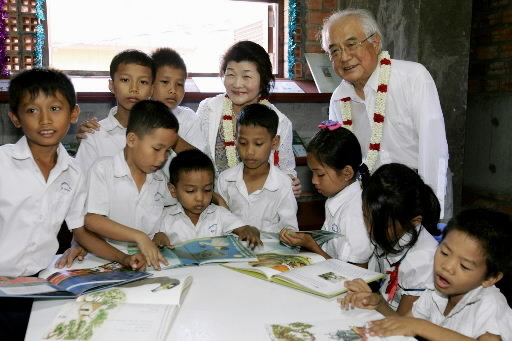Hiroshima citizens donate children’s library to Cambodia
Aug. 30, 2010
A facility established by Hiroshima citizens in Cambodia's capital to facilitate exchanges for promotion of peace opened a library for Cambodian children on Sunday.
Hidetoshi Ito, general manager of Hiroshima House located in central Phnom Penh, said at an opening ceremony that the library was donated by Hiroshima citizens.
He said about 210 illustrated children's books, mostly on Japanese folktales, have translated into Cambodia's Khmer language since last November by some 38 Cambodian students studying Japanese.
The number of donated books will increase over time to around 500.
Among the 100 or so people attending the ceremony were Takashi Hiraoka, a former mayor of Hiroshima City, and Katsuhiro Shinohara, a former Japanese ambassador to Cambodia.
Hiraoka, who now serves as director general of the Association for Exchange between Hiroshima Citizen and Cambodian, said at the ceremony that Cambodia's future depends on its children and ''reading is really important'' for them to acquire deep knowledge and contribute to the country's development.
Shinohara, who speaks fluent Khmer, said he was happy to witness the new opening of the library, which Cambodian children can use to absorb more knowledge after their regular school hours.
Hiroshima House is located near the Royal Palace in a monastery complex that serves as the headquarters of Cambodia's Theravada Buddhism.
Designed for multifunctional use, including for language teaching and educational exhibitions, the five-story building was constructed little by little by Hiroshima volunteers visiting the country between 1995 and 2006, when it was completed.
According to organizers, Hiroshima citizens, whose city experienced the atomic bomb, began the project to help Cambodians overcome the devastation, hardships and sorrow left by the Khmer Rouge's genocidal rule in the late 1970s and decades of civil war.
In addition to providing lodging and various courses for Cambodians, it has a museum and a Japanese library.
Though small in scale, the idea is to promote the self-sufficiency of the Cambodian people, rather than simply and temporarily providing them with money and goods.
(Distributed by Kyodo News on Aug. 29, 2010)
Hidetoshi Ito, general manager of Hiroshima House located in central Phnom Penh, said at an opening ceremony that the library was donated by Hiroshima citizens.
He said about 210 illustrated children's books, mostly on Japanese folktales, have translated into Cambodia's Khmer language since last November by some 38 Cambodian students studying Japanese.
The number of donated books will increase over time to around 500.
Among the 100 or so people attending the ceremony were Takashi Hiraoka, a former mayor of Hiroshima City, and Katsuhiro Shinohara, a former Japanese ambassador to Cambodia.
Hiraoka, who now serves as director general of the Association for Exchange between Hiroshima Citizen and Cambodian, said at the ceremony that Cambodia's future depends on its children and ''reading is really important'' for them to acquire deep knowledge and contribute to the country's development.
Shinohara, who speaks fluent Khmer, said he was happy to witness the new opening of the library, which Cambodian children can use to absorb more knowledge after their regular school hours.
Hiroshima House is located near the Royal Palace in a monastery complex that serves as the headquarters of Cambodia's Theravada Buddhism.
Designed for multifunctional use, including for language teaching and educational exhibitions, the five-story building was constructed little by little by Hiroshima volunteers visiting the country between 1995 and 2006, when it was completed.
According to organizers, Hiroshima citizens, whose city experienced the atomic bomb, began the project to help Cambodians overcome the devastation, hardships and sorrow left by the Khmer Rouge's genocidal rule in the late 1970s and decades of civil war.
In addition to providing lodging and various courses for Cambodians, it has a museum and a Japanese library.
Though small in scale, the idea is to promote the self-sufficiency of the Cambodian people, rather than simply and temporarily providing them with money and goods.
(Distributed by Kyodo News on Aug. 29, 2010)








